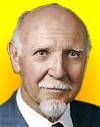 (source)
(source)
|
Raymond Cattell
(20 Mar 1905 - 2 Feb 1998)
English-American psychologist who applied mathematical techniques to the study of psychology and developed the 16 Personality Factor (16PF) test.
|
Raymond Cattell
“Psychology is…in language which no one understands”
Illustrated Quote - Medium (500 x 250 px)
More Raymond Cattell quotes on science >>
Raymond Cattell was an internationally known personality theorist. In his book, The Scientific Analysis of Personality, Cattell reviews his experimental, quantitative and statistical research in personality testing. Measurement is the domain of physical science, but its application in psychology is less obvious. In his introductory survey, distinguishing between the two fields of science Cattell writes:
“In physical science, at least until recently, the layman could go a long way in understanding the essentials with little disciplining in method. But psychology is a more tricky field, in which even outstanding authorities have been known to run in circles ‘describing things which everyone knows in language which no one understands.’”
Cattell had long believed that measurement can be used in personality testing. Thirteen years earlier, in the preface to his book, Factor Analysis (1952), he wrote1:
“If the comparatively coarse problems of the engineer can be mastered only by a thorough grounding in mathematics, how much more exquisite must be the mathematical sense of the practitioner concerned with the prediction or control of human behavior?”
To this, Gordon V. Anderson, writing a book review at that time showed skepticism: “However desirable a grasp of statistical techniques may be, it is rather specious to place the research problems of human behavior on a continuum with those of physical science, implying a similarity which may not exist.”2
Nevertheless, Cattell pursued his research, applying the scientific method in his chosen field, because he understood that, as historically long-known in the physical sciences, progress began with unsubstantiated theories, followed by objective testing.
2 Review, Gordon V. Anderson, 'Factor Analysis by Raymond B. Cattell,' The Southwestern Social Science Quarterly (Mar 1953), 33, No. 4, 347.
- Science Quotes by Raymond Cattell.
- 20 Mar - short biography, births, deaths and events on date of Cattell's birth.
- Raymond Cattell - context of quote “Psychology is…in language which no one understands” - Large image (800 x 400 px)
- The Scientific Analysis of Personality, by Raymond B. Cattell. - book suggestion.
- Booklist for Raymond Cattell.






